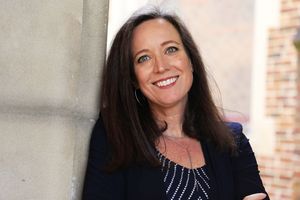GTU Communications
Interview | New Dean and VP for Academic Affairs: Jennifer W. Davidson, PhD
Dr. Jennifer W. Davidson (PhD, GTU 2011) is Professor of Theology & Worship at Berkeley School of Theology (BST), where she has taught for the past 15 years, and a member of the Core Doctoral Faculty at the GTU. Dr. Davidson was named the incoming GTU Dean and Vice President for Academic Affairs, a role she will formally begin on July 1, 2022. Moreover, she will be appointed as the John Dillenberger Professor of Theology.
GTU: Congratulations on being named incoming Dean and Vice President for Academic Affairs! To begin, can you share with us about your background with the GTU? In what capacities have you been involved with the GTU? What have been some of your most meaningful experiences here?
Jennifer W. Davidson: Thank you so much! I am really looking forward to stepping into this new opportunity to serve at the GTU. I first came to the GTU back in 2003 as a new PhD student and Presidential Scholar in Liturgical Studies. My marriage partner Doug and I made the cross-country trip from Philadelphia to Berkeley with our five-year-old son Elliot tucked into the back seat of our little Nissan Sentra. Elliot started kindergarten the same week I started orientation at the GTU!
As a PhD student at the GTU, I had fantastic opportunities to serve as a teaching assistant for my advisor Andrea Bieler and Luise Schottroff, a visiting scholar at the time. Through their mentorship, they modeled intentional and effective team-teaching, and they both fully incorporated me into their planning and pedagogy.
In July 2007, I joined the full-time faculty at Berkeley School of Theology (BST, formerly American Baptist Seminary of West), teaching constructive theology and worship.
For my first few years as a consortial faculty member at the GTU, I was still completing my dissertation. I straddled the roles of PhD candidate and full-time faculty until I defended my dissertation in February 2011. From that moment on, I eagerly pursued opportunities to contribute to the life of the GTU, eventually becoming a member of the core doctoral faculty in 2016.
Over the years, I’ve enjoyed serving in many ways, including as a member of the faculty council, where I was involved in helping to create a framework for academic advising. I also served on the committee that reviewed the doctoral program and the steering committee for the Women’s Studies in Religion (WSR) academic certificate, including as chair of the committee for several years. Most recently, in 2020, I was a member of the core team for our strategic planning process. Over the last two years, I have served as the chair of the Religion & Practice Department. You know, one of my favorite committee assignments at the GTU was the Awards Committee. You get to read Newhall proposals from students and help distribute fellowship funds for a lot of fantastic projects and courses!
In addition to the courses I’ve taught at BST, which almost always include students from across the consortium, I have also had the opportunity to teach several courses for the GTU and supervise Newhall fellows. I have had deeply rewarding experiences teaching the Women’s Studies in Religion seminar, a required course for students who earn the WSR certificate. And I loved teaching the Seminar on Interdisciplinarity with Arthur Holder in 2019 and 2020. That course is the best way to get to know our incoming students across all departments in the PhD program. I have also taught a PhD course in pedagogy and taught numerous special reading courses at BST and the GTU on topics like indigenous feminist theology, tribal theology (indigenous Naga), liberative pedagogy, and contemporary practical theology.
My most meaningful experiences at the GTU center on students. Our students are involved in groundbreaking scholarship, and I am filled with hope whenever I engage their work, whether at a student-led conference sponsored by one of our academic centers or WSR, sitting on comps committees, or participating in dissertation defenses. Over the last couple of years alone, I have had the privilege to chair committees for students who were writing about Hush Harbor pedagogy (A. Vanessa Hawkins), a Womanist approach to contemplative Christian spirituality (Ineda Adesanya), and co-creating virtual community during the pandemic (Kelly Colwell). Our students do work that matters, and they make a difference for the better in our world.
GTU: As a GTU alum, you have first-hand experiences of the GTU as a student. What student experiences at the GTU help shape your vision for this role? What other experiences have helped prepare you for this role?
JWD: Honestly, earning a PhD was one of the hardest things I’ve ever had to do. I wasn’t really close to anyone who had been through the process of doctoral studies, so I had to learn about the culture of academia as I went through it. Even though I had been awarded the Presidential Scholarship, I still struggled to believe that I belonged in a PhD program at all. It took me a couple of months of feeling this way before I sat down with a few friends in the program, and we committed to seeing each other through. We didn’t want just to survive our work but to thrive while we did it. We committed to setting time aside to read one another’s work, to share regular meals together, to encourage one another when we were down, and to celebrate one another’s success when we would reach important milestones.
I learned through this experience that the myth of solitary scholars who rely solely on their own genius was a dangerous and even destructive illusion. And I also learned that we are capable of shaping (and reshaping) our world by the way we choose to live amid struggles.
By connecting with my colleagues in the PhD program, together we shaped a world where we could be honest, vulnerable, connected, bold, and joyful together. When I became a professor, and now as I prepare to become dean, I am committed to remembering what was hard about the student experience and living out those values wherever I find myself in academia—honesty, vulnerability, connection, boldness, and joy.
GTU: Your own scholarship is in the areas of liturgical studies and, most recently, trauma-informed pedagogy. Can you tell us more about what you’re working on in these areas? How are you seeing this work speak to our present moment?
JWD: My research in liturgical studies focuses on free-church liturgy and theology that is ordinary, conversational, and constructive. I focus on the intersections of spirituality, race, gender, and justice. I have developed an interdisciplinary approach that engages biblical hermeneutics (including socio-cultural analysis, reception history, and literary interpretation); history (specifically, history of theology and how ideas have shifted over time, as well as liturgical history, namely why and how ritual practices emerged and how they have changed over time); ritual studies (especially by employing qualitative ethnographic methods such as participant observation, deep description, interviews with informants, interpretation of those interviews, and ‘closing the loop’—meaning, returning to my informants with my findings and asking them if my interpretations are accurate); and finally creative writing through the crafting of liturgies and prayers, but also in the creative writing of theology itself.
The work we do as scholars in religious studies and theology is soul-baring work. When we confront entrenched problems, we often absorb the heartrending pain in the world. In 2018, I realized that there was a scarcity of resources available for teaching from a trauma-informed perspective in the graduate theological classroom. Most of the research done in that area was focused on K-12 educational settings. And yet, I was aware of how many of my students (and, indeed, how many faculty members) had experienced significant trauma in their lives. So, I threw myself into that research with a feeling of urgency. To do this, I needed to engage neuroscience, cognitive-behavioral psychology, social work, and pedagogy studies. As I did the research, I grew increasingly hopeful about how powerful it can be to incorporate trauma-informed principles into our classes. In fact, I often refer to these approaches as trauma-informed and hope-infused.
Now, two years into the pandemic, which has been an experience of collective trauma, we are also aware of the ways mental health has suffered for students and faculty alike, making trauma-informed approaches more crucial than ever. We can be trauma-informed and hope-infused at every level of the institution, cultivating environments of safety, trust, choice, collaboration, and empowerment.
These commitments need to inform policies, campuses, workloads, and leadership. Trauma-informed and hope-infused learning environments are holistic. They focus on sustainability, foster empathy, encourage deep learning, and are conducive to human and planetary flourishing.
GTU: As you take up the role of Dean and VP for Academic Affairs, what challenges do you foresee for the GTU, and how do you plan to address those? What are your hopes for this role?
JWD: Over the last two years, our staff, faculty, and students have had to lean into our agility, inventiveness, creativity, and resiliency as we face the global pandemic. In the coming years, we will need to build from these strengths while also paying attention to repairing the places where the strain of these years has made many people threadbare. In this sense, I think we will need to be both inwardly and outwardly focused, tending to the health and sustainability of those of us within the GTU even as we continue to extend our reach for greater accessibility on local and global levels. I think we can explore opportunities, possibly through existing or new partnerships, that will provide GTU community members (international and domestic students, faculty, and staff) with the resources needed to recover from pandemic exhaustion, burnout, and stress so that we can tackle our strategic initiatives and scholarly work with vigor and joy. Also, in alignment with the report from the Select Committee on Diversity, Equity, and Inclusion, we need to focus on faculty development to support our interreligious and interdisciplinary needs. Even as we return to in-person classes, I hope we will continue developing and expanding our virtual and remote learning opportunities as we increase the GTU’s potential for reaching new audiences.
GTU: The last two years have been a time of seismic change for higher education. What gives you confidence in the GTU’s ability to respond to these changes and lead in a way that shapes the future of theological education?
JWD: There are so many reasons I am confident in the GTU’s ability to shape the future of theological education and religious studies! The GTU’s origins are rooted in radical collaboration through ecumenical and interreligious partnerships and robust interdisciplinary scholarship. For decades, the GTU has attracted dynamic, justice-centered, self-starting students interested in effecting positive change through scholarly research and activism rooted and informed by our religious, spiritual, and wisdom traditions. We are building from a place of existing strengths, including our world-class library for research in the areas of religious studies and theology, our well-established, long-term relationship with UC Berkeley, and our stellar faculty and center directors. I love the work we do together at the GTU. And I love the world that we are shaping positively through our questions, research, and daily, small interactions and conversations.
By keeping our mission (our “why”) front-and-center, I am confident that we will live into our vision at the GTU to become an ecosystem of creativity, connection, and community.


